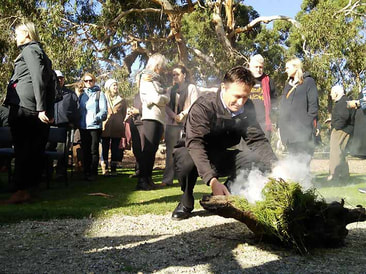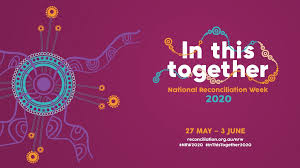 National Reconciliation Week, smoking ceremony, Cowes cultural centre, 2018. This year’s gatherings are all virtual, but there’s still plenty happening
National Reconciliation Week, smoking ceremony, Cowes cultural centre, 2018. This year’s gatherings are all virtual, but there’s still plenty happening By Marg Lynn
HOW amazing that the theme for National Reconciliation Week is In This Together, the same term that has been bouncing around the COVID narrative as an expression of our shared humanity.
“In this together” is a hopeful message that sings with the positivity of the Uluru Statement from the Heart, declared three years ago to define a pathway for Black and White Australians to walk together towards a better future. They asked for constitutional recognition, enabling a Voice to Parliament to provide an Aboriginal perspective, but not a vote, on legislation that impacts on their communities.
HOW amazing that the theme for National Reconciliation Week is In This Together, the same term that has been bouncing around the COVID narrative as an expression of our shared humanity.
“In this together” is a hopeful message that sings with the positivity of the Uluru Statement from the Heart, declared three years ago to define a pathway for Black and White Australians to walk together towards a better future. They asked for constitutional recognition, enabling a Voice to Parliament to provide an Aboriginal perspective, but not a vote, on legislation that impacts on their communities.
And they asked for a Makarrata Commission to oversee the development of truth-telling and treaty-making, so that the nation will move forward in acceptance, not denial, of our grim history of race relations since colonisation.
None of that should be too hard. If we believe in equality, if we believe that we are Australians “in this together”, (and with the right kind of leadership), we can make it happen. The vast majority of Australians, when polled, supported the Uluru Statement despite then prime minister Malcolm Turnbull ruling it out without due and respectful consideration.
We can choose to champion equality and learn more about how inequality manifests itself for Aboriginal people. We can learn why an Aboriginal Voice to Parliament is the best way to enable self-determination for Aboriginal communities. We can also learn a great deal from Aboriginal people about land, relationships and culture.
None of that should be too hard. If we believe in equality, if we believe that we are Australians “in this together”, (and with the right kind of leadership), we can make it happen. The vast majority of Australians, when polled, supported the Uluru Statement despite then prime minister Malcolm Turnbull ruling it out without due and respectful consideration.
We can choose to champion equality and learn more about how inequality manifests itself for Aboriginal people. We can learn why an Aboriginal Voice to Parliament is the best way to enable self-determination for Aboriginal communities. We can also learn a great deal from Aboriginal people about land, relationships and culture.
 National Reconciliation Week events including film screenings, panel discussions and concerts are taking place throughout the week, all on-line. See: https://nrw.reconciliation.org.au/
National Reconciliation Week events including film screenings, panel discussions and concerts are taking place throughout the week, all on-line. See: https://nrw.reconciliation.org.au/ We were not taught these things in school. If you are of my generation, you were taught that Aboriginal people were nomadic only, and that they would die out. We were not encouraged to see Aboriginal people as an enriching and fundamental part of our diverse population.
We now know how brilliantly they cared for country over 60,000 or more years of evolving complex agricultural and cultural practices. How they grew crops, managed fire to shape the land; how they are at one with the land, in a spiritual connection between nature and culture.
In 230 years we have learnt little from them, preferring to import or develop our technologies rather than understand and work with the fragility of our ecology. Our land management practices of extraction and exploitation have led us to environmental crisis and disaster. We are only now starting to look to Aboriginal ways of knowing and doing.
Let us hope that we can move forward “in this together”, accepting with humility that we have much to learn, and Aboriginal people have much to teach us, about our shared humanity.
Marg Lynn is a member of the Bass Coast Reconciliation Network, which hosted a virtual gathering to celebrate National Reconciliation Week on Wednesday.
We now know how brilliantly they cared for country over 60,000 or more years of evolving complex agricultural and cultural practices. How they grew crops, managed fire to shape the land; how they are at one with the land, in a spiritual connection between nature and culture.
In 230 years we have learnt little from them, preferring to import or develop our technologies rather than understand and work with the fragility of our ecology. Our land management practices of extraction and exploitation have led us to environmental crisis and disaster. We are only now starting to look to Aboriginal ways of knowing and doing.
Let us hope that we can move forward “in this together”, accepting with humility that we have much to learn, and Aboriginal people have much to teach us, about our shared humanity.
Marg Lynn is a member of the Bass Coast Reconciliation Network, which hosted a virtual gathering to celebrate National Reconciliation Week on Wednesday.